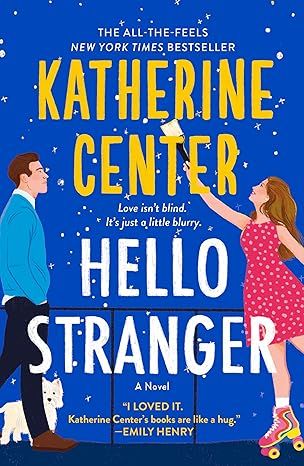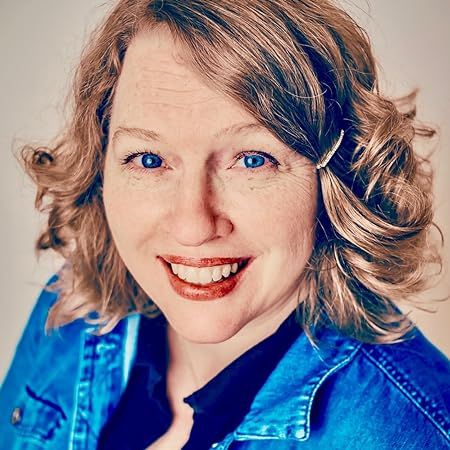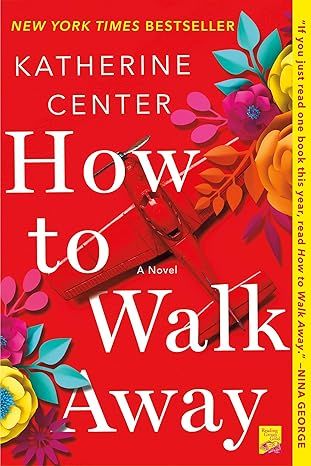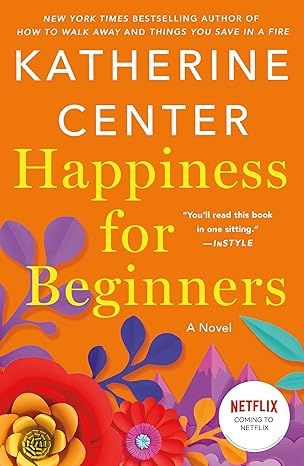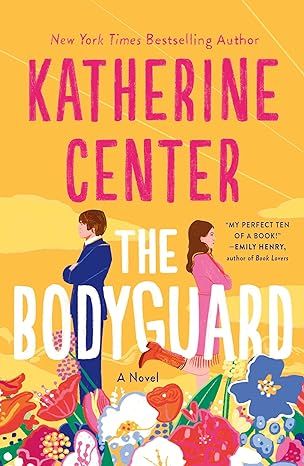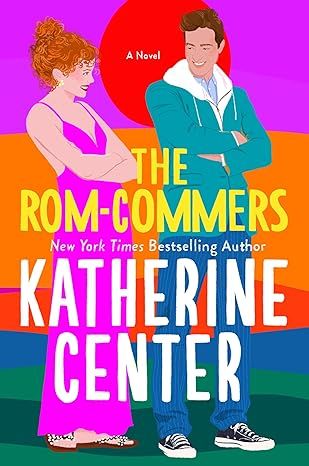Hello Stranger
4.2
-
5,591 ratings
The glorious novel from the beloved author whose bright, hopelessly romantic New York Times bestsellers have been called “My perfect 10 of a book” (Emily Henry) and cheered for their “speedy pacing and sexual tension for miles” (People).
Love may be blind. But what if . . . what you see isn't what you get?
It’s all starting to come together for struggling artist Sadie Montgomery. She was just named a finalist in the national portrait competition of her dreams. But when she winds up with a rare, but real, condition where human faces look like jumbled puzzle pieces . . . it is, to say the least, not good.
With only a few weeks to paint the best portrait of her entire life, Sadie will do anything to reverse her condition and get back to work, but it’s anyone’s guess when (or even if) that'll happen.
Enter her dog’s charming veterinarian (who may or may not be Sadie’s daydream fiancé), and her bowling-jacket-wearing, Vespa-riding neighbor (who she can’t seem to stay away from)—both vying for her attention and adding to the chaos.
It’s a lot, but that doesn’t mean it’s bad. Because the truth is, seeing the world differently has its upsides. And love has an undeniable way of giving us courage. And the best way of looking is always, always with the heart.
"With its emphasis on its central character, combined with its “swoony” romance, “Hello Stranger” is a hit. Sadie is everything you could want in a protagonist — the right amount of quirky, sunshiney and stubborn, and the men she’s in love with are equally fascinating. All the side characters provide humor and comfort, and even those characters who you aren’t really supposed to like are annoyingly intriguing and captivating. Center created a brilliant cast of characters, set to a plot that’s sure to keep you reading." --Michigan Daily
Read more
Kindle
$12.99
Available instantly
Audiobook
$0.00
with membership trial
Hardcover
$16.29
Paperback
$16.29
Ships from
Amazon.com
Payment
Secure transaction
ISBN-10
1250336155
ISBN-13
978-1250336156
Print length
352 pages
Language
English
Publisher
Griffin
Publication date
May 27, 2024
Dimensions
5.35 x 0.9 x 8.2 inches
Item weight
10.2 ounces
Product details
ASIN :
B0B9KVDK8P
File size :
4239 KB
Text-to-speech :
Enabled
Screen reader :
Supported
Enhanced typesetting :
Enabled
X-Ray :
Enabled
Word wise :
Enabled
Editorial reviews
A New York Times bestseller
A USA Today Bestseller
"Irresistibly fun...a fresh look at how people often let pride or misconceptions get in the way of their own happiness. Sure to grab readers right off the bat." --Shelf Awareness
"The latest from the author of The Bodyguard (2022) is a winsome tale of a woman overcoming adversity and learning to lean on the people who care about her." --Booklist
"This charming, heartfelt romantic comedy has a well-told, unique storyline, and Sadie’s prosopagnosia feels deftly explained, explored, and treated with respect. There’s chemistry between the protagonists with a slow-burn relationship, but there’s also a focus on Sadie’s mental and emotional growth, as well as her artistic frustrations and problem-solving methods. Readers who enjoy Jenny Colgan and Susan Mallery will love this engaging, well-written romance from Center (The Bodyguard)." --Library Journal
"With a thoroughly modern millennial heroine at the helm, Center takes Sadie’s life seriously and her struggles with adulting resonate even before her face blindness sets in. Meanwhile, a dash of humor and an endearing love story make the pages fly. Readers will be hooked." -- Publishers Weekly (Starred Review)
“[A]uthor Katherine Center is back this summer with another voice-driven, funny, heartfelt and romantic escapist novel.” --Good Morning America Online
“Laugh-and-cry specialist Katherine Center (The Bodyguard) returns with the love story of talented artist Sadie Montogmery.” --Goodreads
“In this romantic comedy with depth, a health emergency leaves a struggling portrait artist unmoored with a possibly temporary diagnosis of face blindness.” --Lansing State Journal
"With its emphasis on its central character, combined with its “swoony” romance, “Hello Stranger” is a hit. Sadie is everything you could want in a protagonist ― the right amount of quirky, sunshiney and stubborn, and the men she’s in love with are equally fascinating. All the side characters provide humor and comfort, and even those characters who you aren’t really supposed to like are annoyingly intriguing and captivating. Center created a brilliant cast of characters, set to a plot that’s sure to keep you reading." --Michigan Daily
Read more
Sample
One
THE FIRST PERSON I called after I found out I’d placed in the North American Portrait Society’s huge career-making yearly contest was my dad.
Which is weird. Because I never called my dad.
Not voluntarily, anyway.
Sure, I called on birthdays or Father’s Day or New Year’s—hoping to get lucky and miss him so I could leave a singsongy message like “So sorry to miss you,” get the credit, and be done.
But I called only out of obligation. Never for fun. Never, ever just to talk. And never—god forbid—to share things.
My goal was always not to share things with my father. How broke I was. How I was still—endlessly—failing in my chosen career. How I’d given up on yet another relationship and moved into my not-fit-for-human-habitation art studio because I couldn’t afford a place of my own.
That was all need-to-know information.
And he definitely didn’t need to know.
It gave me some structure, in a way—crafting ongoing fake success stories about myself for him and my evil stepmother, Lucinda. I was always “doing great.” Or “crazy busy.” Or “thriving so much.”
I didn’t actively make things up. I just worked devotedly to obscure the truth.
The truth was, I’d defied all my dad’s instructions eight years before, dropping out of premed and switching my college major to Fine Arts.
“Fine Arts?” my father had said, like he’d never heard the term before. “How exactly are you supposed to make a living with that?”
I gave him a little shrug. “I’m just going to … be an artist.”
Wow, those words did not land well.
“So you’re telling me,” he demanded, that little vein in his forehead starting to darken, “that you want to be buried in a pauper’s grave?”
I frowned. “I wouldn’t say I want that.”
It’s possible my dad wanted me to be a doctor because he was a doctor. And it’s possible my dad didn’t want me to be an artist because my mom had been an artist. But we didn’t talk about that.
He went on, “You’re throwing away a good career—a good living—so that you can waste your life doing something that doesn’t matter for no money?”
“When you put it that way, it sounds like a bad idea.”
“It’s a terrible idea!” he said, like that was all there was to it.
“But you’re forgetting two things,” I said.
My dad waited to be enlightened.
“I don’t like medicine,” I said, counting off on my fingers. “And I do like art.”
Suffice it to say, he didn’t think any of that was relevant. Then he went on to imply that I was spoiled and foolish and had never known true suffering.
Even though we both knew—on that last one, at least—he was lying.
Anyway, it didn’t matter. He didn’t get to decide what I did with my life.
I was the one who had to live it, after all.
My dad was not a big fan of losing. “Don’t ask me for help when you’re broke,” he said. “You’re on your own. If you choose this path for yourself, then you have to walk it.”
I shrugged. “I haven’t asked you for help since I was fourteen.”
At that, my dad stood up, scooting back his café chair with a honk that announced he was done. Done with this conversation—and possibly done with fatherhood, as well.
I still remember the determination I felt as I watched him leave. It seems almost quaint now. I’ll show you, I remember thinking, with a self-righteous fire in my eyes. I’ll make you wish you’d believed in me all along.
Spoiler alert: I did not show him. At least not so far.
That was eight years ago.
I’d gotten that BFA in Fine Arts. I’d graduated all alone, and then I’d marched past all the families taking proud pictures, and then I’d driven triumphantly out of the university parking lot in my banged-up Toyota that my friend Sue and I had painted hot pink with flames for the Art Car Parade.
And then?
I’d embarked on many endless years of … not showing him.
I applied to contests and didn’t win. I submitted my work for shows and didn’t get accepted. I eked out a living selling portraits from photos (both human and pet) on Etsy at a hundred dollars a pop.
But it wasn’t enough to make rent.
And whenever I talked to my dad, I pretended I was “thriving.”
Because he might have been right that day. I might be headed for a pauper’s grave. But I would be under the dirt in that grave before I’d ever admit it.
That must have been why I called him about placing in the contest.
The contest itself was a big deal—and huge prize money, if you could win it.
I guess the lure of having a genuine triumph to report kept me from thinking clearly.
Plus, don’t we all, deep down, carry an inextinguishable longing for our parents to be proud of us? Even long after we’ve given up?
In the thrill of the moment, I forgot that he didn’t care.
It was a good thing—and no surprise—that my call went straight to his voicemail. It meant I could make my next call. To somebody who did care.
“What!” my friend Sue shouted as soon as the words were out. “That’s huge!” She stretched out the U for what felt like a full minute. Huuuuuuuuuuuuuuuge.
And I just let myself enjoy it.
“The grand prize is ten thousand dollars,” I added when she was done.
“Oh my god,” she said. “Even huger.”
“And guess what else?”
“What?”
“The big show—the juried show where they pick the winner—is here. In Houston.”
“I thought it was Miami this year.”
“That was last year.”
“So you don’t even have to travel!” Sue said.
“Which is perfect! Because I can’t afford to!”
“It’s meant to be!”
“But is it too meant to be? Is it so in my favor, it’ll jinx me?”
“There’s no such thing as too meant to be,” Sue said. Then, as if there’d been a question, she said, “Anyway, it’s settled.”
“What’s settled?”
“We have to throw a party!” she said. Ever the extreme extrovert.
“A party?” I said, in a meek attempt at resistance.
“A party! A party!” Sue practically sang into the phone. “You’ve been tragically failing at life for years and years! We have to celebrate!”
Tragically failing at life seemed a bit harsh.
But fine. She wasn’t wrong.
“When?” I said, already dreading all the cleaning I’d have to do.
“Tonight!”
It was already close to sunset. “I can’t throw a—” I started, but before I even got to “party tonight,” it was decided.
“We’ll do it on your rooftop. You needed a housewarming party, anyway.”
“It’s not a house,” I corrected. “It’s a hovel.”
“A hovelwarming, then,” Sue went on, taking it in stride.
“Won’t your parents get mad?” I asked. Mr. and Mrs. Kim owned the building—and technically I wasn’t even supposed to be living there.
“Not if it’s a party for you.”
Sue, whose Korean given name, Soo Hyun, had been slightly Americanized by an immigration official, had also disappointed her parents by becoming an art major in college—which was how we’d bonded—although her parents were too softhearted to stay mad for long. Eventually they’d kind of adopted me, and they liked to tease Sue by calling me their favorite child.
All to say—this party was happening.
This was our Oscar and Felix dynamic. Sue always optimistically, energetically, and joyfully searched out ways for us to extrovert. And I always resisted. And then grudgingly gave in.
“You can’t organize a party in two hours,” I protested.
“Challenge accepted,” Sue said. Then she added, “I’ve already sent the group text.”
But I still kept protesting, even after I’d lost. “My place isn’t fit for a party. It’s not even fit for me.”
Sue wasn’t going to fight me on that. I was sleeping on a Murphy bed I’d found in the large trash. But she was also not brooking protests. “We’ll all stay outside. It’s fine. You can finally hang those bulb lights. We’ll invite everybody awesome. All you have to do is get some wine.”
“I can’t afford wine.”
But Sue wasn’t liking my attitude. “How many people entered the first round?” she demanded.
“Two thousand,” I said, already giving in.
“How many finalists are there?”
“Ten,” I answered.
“Exactly,” Sue said. “You’ve already annihilated one thousand nine hundred and ninety competitors.” She paused for impact, then snapped her fingers as she said, “What’s another nine?”
“How is that relevant?” I asked.
“You’re about to win ten thousand dollars. You can afford one bottle of wine.”
AND SO SUE set about making a last-minute party happen.
She invited all our art-major friends—with the exception of my ex-boyfriend, Ezra—and some of her art-teacher buddies, and her longtime boyfriend, Witt—not an artist: a business guy who’d been the captain of his track team in college. Sue’s parents approved of him, even though he wasn’t Korean, because he was sweet to her—and also because he made a good living and so, as her dad put it, she could be “a starving artist without having to starve.”
Sue said—lovingly—that Witt could be our token jock.
My job was to put on the vintage pink party dress with appliquéd flowers that had once been my mother’s and that I wore only on very, very special occasions … and then to go off in search of the most wine I could get with a twenty-dollar bill.
I lived in the old, warehouse-y part of downtown, and the only grocery store within walking distance had been there since the 1970s—a cross between a bodega and a five-and-dime. There was fresh fruit up front, and old-time R&B played on the sound system, and Marie, the ever-present owner, sat by the register. She always wore bright-patterned caftans that lit up her warm brown skin, and she called everybody baby.
Just as I walked in, my phone rang. It was my dad calling me back.
Now that the initial rush had passed, I debated whether to answer. Maybe I was just setting us both up for disappointment.
But in the end, I picked up.
“Sadie, what is it?” my dad said, all business. “I’m boarding a flight to Singapore.”
“I was calling you with some good news,” I said, ducking into the cereal aisle and hushing my voice.
“I can’t hear you,” my dad said.
“I just have some good news,” I said a little louder. “That I wanted”—was I really doing this?—“to share.”
But my dad just sounded irritated. “They’ve got dueling announcements going over the loudspeakers and I’ve got one percent battery. Can it wait? I’ll be back in ten days.”
“Of course it can wait,” I said, already deciding that he’d forfeited his chance. Maybe I’d tell him when I had that ten-thousand-dollar check in my pocket. If he was lucky.
Or maybe not. Because right then the line went dead.
He hadn’t hung up on me, exactly. He’d just moved on to other things.
We were done here. Without a goodbye. As usual.
It was fine. I had a party to go to. And wine to buy.
As I moved into the wine aisle, Smokey Robinson came over the sound system with a song that had been one of my mom’s favorites—“I Second That Emotion.”
Normally I would never sing along out loud to anything in public—especially in falsetto. But I had many happy memories of singing along to that song with my mom, and I knew it was all too easy for me to stew over my dad’s toxicity, and it kind of felt, in that moment, like Smokey had showed up right then to throw me an emotional lifeline.
I glanced over at the owner. She was on the phone with somebody, laughing. And as far as I could tell, there was no one else in the store.
So I gave in and sang along—quietly at first, and then a little louder when Marie didn’t notice me at all. Shifting back and forth to the beat, there in my ballet flats and my mom’s pink party dress, I just gave in and let myself feel better—doing a shimmy my mom taught me and throwing in an occasional booty shake.
Just a little private, mood-lifting dance party for one.
And then something hit me, there in the aisle, singing an old favorite song while wearing my long-lost mother’s dress: My mother—also a portrait artist—had placed in this contest, too.
This exact same contest. The year I turned fourteen.
I’d known it when I applied. But to be honest, I applied to so many contests so often, and I got rejected so relentlessly, I hadn’t thought too much about it.
But this was the one. The one she’d been painting a portrait for—of me, by the way—when she died. She never finished the portrait, and she never made it to the show.
What had happened to that portrait? I suddenly wondered.
If I had to bet? Lucinda threw it away.
I’m not a big weeper, in general. And I’m sure it was partly all the excitement of placing in the contest, and partly the unexpected harshness of my dad’s voice just then, and partly the fact that I was wearing my long-lost mother’s clothes, and partly the realization that this contest was her contest … but as happy as I felt singing along to that old favorite song in an empty grocery store, I felt sad, too.
I felt my eyes spring with tears over and over, and I had to keep wiping them away. You wouldn’t think you could do all those things at once, would you? Dancing, singing, and getting misty-eyed? But I’m here as proof: It’s possible.
But maybe that song really was a talisman for joy, because just as the song was ending, I spotted a wine with a celebratory polka-dotted label on sale for six dollars a bottle.
By the time I made it to the register with my arms full of wine, I was feeling like Sue had the right idea. Of course we should celebrate! I’d have to put my dog Peanut—who was even more introverted than I was—in the closet with his dog bed for a few hours, but he’d forgive me. Probably.
I picked up some little taco-shaped dog treats as a preemptive apology. They’d take me over budget, but Peanut was worth it.
At the register, I eyed a little bouquet of white gerbera daisies, thinking it might be nice to have one to tuck behind my ear—something my mom used to do when I was little. It felt like she might like to see me celebrate that way. With a flower.
But then I decided it was too expensive.
Instead, I set the wine and dog treats on the counter, smiling at the store owner, and I reached around for my purse …
Only to realize I didn’t have it.
I looked down and then felt my other hip, to see if I might have slung it on backward. Then I glanced around at the floor to see if I’d dropped it. Then I left my wine and dog treats on the counter, holding my finger up like “one second” as I dashed to check the empty aisles.
Nothing. Huh. I’d left it at home.
Not all that surprising, given the flurry of today.
Marie had already started ringing up the wine by the time I got back and so, not wanting to interrupt her conversation, I shook my hands at her, like, Never mind.
She looked at me like, Don’t you want this?
I shrugged back in a way that tried to convey, I’m so sorry! I forgot my purse.
She dropped her shoulders in a sigh, but before she could start to cancel everything, a man’s voice from behind me said, “I’ll get it.”
I turned around in surprise, frowning at him, like, How did you get in here?
But he just gave me a nod and turned back to the owner. “I can cover that.”
This isn’t relevant … but he was cute.
He was a generic white guy—you know, the kind that’s practically a Ken doll. But a really, really appealing version.
Because of my job as a portrait artist, I can never look at a face for the first time without mentally assessing it for its shapes and structure and most compelling features—and I can tell you exactly why he was handsome and also why he was basic. Artistically, I mean.
Everything about him was generically, perfectly proportional. He didn’t have an outsize chin, for example, or cavernous nostrils or Dumbo ears. He didn’t have Steven Tyler lips or crazy teeth or a unibrow. Not that any of those things are bad. Distinctive features make a face unique, and that’s a good thing. But it’s also true that the most generic faces are consistently rated as the best-looking.
Like, the more you look like a composite of everyone, the more we all like you.
This guy was as close to a composite as I’d seen in a while. Short, neat hair. A proportional forehead, nose bridge, jaw, and chin. Perfectly placed cheekbones. A straight nose with stunningly symmetrical nostrils. And you couldn’t draw better ears. Flawless. Not too flat, but not too protruding. With perfect plump little earlobes.
I am a bit of an earlobe snob. Bad earlobes could really be a deal-breaker for me.
Not kidding: I’ve complimented people on their earlobes before. Out loud.
Which never goes well, by the way.
There are tricks to making a face look appealing when you’re drawing a portrait. Humans seem to find certain elements universally appealing, and if you emphasize those, the person looks that much better. This is a scientific thing. It’s been studied. The theory is that certain features and proportions elicit feelings of “aww, that’s adorable” in us, which prompts caregiving behaviors, affection, and an urge to move closer. In theory, we evolved this reaction in response to baby faces, so we’d feel compelled to take care of our young, but when those same features and patterns crop up in other places, on other faces, we like them there, too.
We can even find sea cucumbers adorable, from the right angle.
Or the man who’s attempting to pay for our wine and dog treats.
Because in addition to his generic handsomeness, this guy also had elements in his features—invisible to the untrained eye—that subliminally established cuteness. His lips were smooth, and full, and a warm, friendly pink that signified youth. His skin was clear in a way that evoked good health. And the real clincher was the eyes—slightly bigger than average (always a crowd-pleaser) with a slight melancholic downturn at their corners that gave him an irresistible sweet puppy-dog look.
I guarantee this guy got every woman he ever wanted.
But that was his business.
I had a forgotten-wallet situation to deal with. And a last-minute party to host.
“It’s fine,” I said, waving my hands at him and rejecting his offer to pay for my stuff.
“I don’t mind,” he said, pulling his wallet out of his jeans.
“I don’t need your help,” I said, and it came out a little harsher-sounding than I meant.
He looked from me—purseless—to the counter of stuff I had yet to pay for. “I think maybe you do.”
But I wasn’t having it. “I can just run home for my purse,” I said. “It’s no problem.”
“But you don’t have to.”
“But I want to.”
What part of I don’t need your help did this guy not understand?
“I appreciate the gesture, sir,” I said then. “But I’m fine.”
“Why are you calling me sir? We’re, like, the same age.”
“Sir is not an age thing.”
“It absolutely is. Sir is for old men. And butlers.”
“Sir is also for strangers.”
“But we’re not strangers.”
“Gotta disagree with you there, sir.”
“But I’m rescuing you,” he said, like that made us friends.
I wrinkled my nose. “I prefer to rescue myself.”
For the record, I recognized that he was trying to do something nice. I also recognized that most of humanity would’ve let him do it, thanked him gratefully, and called it a day. This is the kind of moment that could wind up on the internet, getting passed around with captions like See? People aren’t so terrible after all!
But I wasn’t like most of humanity. I didn’t like being helped. Is that a crime?
Surely I’m not the only person on this planet who prefers to handle things on her own.
It wasn’t him I was opposed to. He was appealing. Strongly, viscerally appealing.
But the helping—including his pushiness about it—was not.
We stared at each other for a second—at an impasse. And then, for no reason, he said, “That’s a great dress, by the way.”
“Thank you,” I said suspiciously, like he might be using a compliment to lower my defenses. Then without really meaning to, I said, “It was my mother’s.”
“And you do a great Smokey Robinson, by the way.”
Oh god. He’d heard me. I lowered my eyes to half-mast, displeased. “Thanks.”
“I mean it,” he said.
“That sounded sarcastic.”
“No, it was great. It was … mesmerizing.”
“You were watching me?”
But he shook his head. “I was just shopping for cereal. You were the one doing a cabaret show in a grocery aisle.”
“I thought the store was empty.”
He shrugged. “It wasn’t.”
“You should have stopped me.”
“Why would I do that?” he asked, seeming genuinely befuddled. Then, at the memory, something like tenderness lit his expression. He gave a little shrug. “You were a joy.”
I had no idea what to make of this guy.
Was he being sarcastic or serious? Was he handsome or generic? Was he kind to help or too pushy? Was he flirting with me or being a pain? Had he already won me over, or did I still have a choice?
Finally I circled back to: “Fine. Just … don’t help me.”
His expression shifted to wry. “I’m getting the sense that you don’t want me to help you.”
But I played it straight. “That’s correct.”
Then before I could lose any more ground, I turned to the owner at the counter—still chatting away with her friend—and stage-whispered, “I’ll be back in five with my purse.”
Then I zipped out the door.
Case closed.
Read more
About the authors
Katherine Center
BookPage calls Katherine Center “the reigning queen of comfort reads.” She’s the New York Times bestselling author of ten novels, including How to Walk Away, Things You Save in a Fire, The Bodyguard, and her newest, Hello Stranger. Katherine writes laugh-and-cry books about how life knocks us down—and how we get back up. She’s been compared to both Jane Austen and Nora Ephron, and the Dallas Morning News calls her stories, “satisfying in the most soul-nourishing way.” The movie adaptation of her novel The Lost Husband (starring Josh Duhamel) hit #1 on Netflix, and the movie of her novel Happiness for Beginners, starring Ellie Kemper and Luke Grimes, opens July 27 on Netflix. Katherine’s summer 2022 book, The Bodyguard, was an instant New York Times bestseller, a People Best New Books pick, and nominated for Book of the Year by Book of the Month Club. Bestselling author Emily Henry calls The Bodyguard “a shot of pure joy,” and bestselling author Helen Hoang calls it “a perfect feel-good rom-com.” Katherine lives in her hometown of Houston, Texas, with her husband, two kids, and their fluffy-but-fierce dog.
Read more
Reviews
Customer reviews
4.2 out of 5
5,591 global ratings
TM in PA
5
Wonderful slow build romance!
Reviewed in the United States on July 11, 2023
Verified Purchase
What would happen to you if you suddenly lost the one thing that you need for your job, your livelihood, your personal success? Sadie Montgomery is a portrait artist about to potentially get the big break that will make her a success in the eyes of important family members when a potentially serious health condition sidelines her. But even worse, as a portrait artist who specializes in faces, her medical condition has left her with the inability to read faces, called face blindness.
I'll admit, I'd never heard of face blindness and this book makes it so that I'll never forget it! Sadie actually takes her situation quite well and she does have the help of a lovely therapist who helps Sadie navigate this fairly serious change in how she views the world. But there's no way to avoid the fact that the portrait she needs for the contest is not completed, and she'll have to tackle it while she has face blindness.
But there are some bright spots -- namely two -- her new veterinarian who she fantasizes about marrying, and one of her neighbors who lives in the apartment building. Joe, the neighbor, starts out by giving Sadie a wrong impression that gradually changes to something like friendship and maybe more. I don't want to say much more about this, but I truly loved how this unfolded! I had an inkling about what was happening here, but it wasn't confirmed until that glorious ending when a beautiful HEA lands in Sadie's heart.
By the end of this story, I just loved Sadie. The story is told in her voice and point of view which is cute and funny and sometimes sad. Sadie has suffered some loss in her life, for sure. I adored how the family situation come together nicely, even the episode with Sadie's evil stepsister.
I finished this book with a smile on my face and I ended up going back to read the deliciously sweet ending a few times since. Things almost go south for Sadie, but her friends really come through for her.
I loved everything about this -- from the story of a young artist finding her true creative calling to the romance that develops way before the start of the book. The romance here is just a lovely, slow build, that had me loving Sadie and hoping that everything would work out for her.
Overall, this is a terrific feelgood story that had me smiling and re-reading right away. I devoured this is a couple of days because I really needed to know how it all ended up for Sadie, including her art and her family. I just loved this and it will definitely be on my list of favorites for 2023.
Read more
19 people found this helpful
ReadingOnTheBrink
5
Everything you want in a contemporary romance!
Reviewed in the United States on March 18, 2024
Verified Purchase
I am not sure how this slipped through the cracks, as I am an avid Katherine Center reader! Then I realized that I truly hemmed and hawed with how to rate this book - I think I had some growing to do, and I feel this book helped. Originally, I was going to round it to 4 stars, as I found it an easy read, and rather enjoyable, save for a couple of eye-rolls here, and a groan or two there. And the ending? No spoilers here, but I also won't lie - I thought I knew what would happen. In fact I impatiently awaited its happening (hence the rounding to 4). And then I was gob smacked! Yet, it wasn't the ending that made me hesitate my review. I hesitated when I read Center's author's note, because her words made me go back and see the book in a totally different light. Center is 100% right, "love is healing", and "believing in love is believing in hope."
We tend to shrug off what we don't know or don't want to see. " We're all so steeped in our own confirmation bias. We're all so busy seeing what we want to see."
And as women, we rarely want to admit we need help, especially in today's world. We can also be blind to someone else's weaknesses. “Basically we tend to decide on what the world is and who people are and how things are—and then we look for evidence that supports what we’ve already decided. And we ignore everything that doesn’t fit.” Center really does a great job of bringing emotions, fears, desires, and romance all together in a way that is unique and well, educational. That is, if you open your eyes to it. So thank you , Katherine Center, for refreshing my eyes. Forgiving the eyerolls and the few groans, and the fact that I could recommend this to almost anyone with out any qualms or heads-up, Hello Stranger earned 5 stars.
And I know we are not to really quote an arc, but your words in this book are gold, and need to be read:
“The more good things you look for, the more you find.” " Seeming okay and being okay are not the same thing." - "it's better to be real than to be fake." “Seeing the world differently helps you see things not just that other people can’t—but that you yourself never could if you weren’t so lucky. It lets you make your own rules. Color outside your own lines. Allow yourself another way of seeing.” “We’re all just muddling through, after all. We’re all just doing the best we can. We’re all struggling with our struggles. Nobody has the answers. And everybody, deep down, is a little bit lost.”
Read more
4 people found this helpful
Reese
5
Loved it
Reviewed in the United States on June 26, 2024
Verified Purchase
Book club pick
Hello Stranger was the second book I've read from this author and probably my favorite so far. I jokingly said that this would be a 5 star book for me just because of the little old dog, named Peanut because I also had a little old dog named Peanut. The way Sadie felt about her dog was such a relatable and adorable part of this book for me. I loved the MC's the side characters and thought that the premise was so interesting. I also loved learning a little about facial blindness. There were a few things that were a bit predictable, but for the most part I adored everything about this one.
Read more
Top Katherine Center titles
View allSimilar Books
Best sellers
View all
The Tuscan Child
4.2
-
100,022
$8.39

The Thursday Murder Club: A Novel (A Thursday Murder Club Mystery)
4.3
-
155,575
$6.33

Sapiens: A Brief History of Humankind
4.6
-
140,302
$13.49

The Butterfly Garden (The Collector, 1)
4.3
-
88,556
$9.59

Things We Hide from the Light (Knockemout Series, 2)
4.4
-
94,890
$11.66

The Last Thing He Told Me: A Novel
4.3
-
154,085
$2.99

The Perfect Marriage: A Completely Gripping Psychological Suspense
4.3
-
143,196
$9.47

The Coworker
4.1
-
80,003
$13.48

First Lie Wins: A Novel (Random House Large Print)
4.3
-
54,062
$14.99

Mile High (Windy City Series Book 1)
4.4
-
59,745
$16.19

Layla
4.2
-
107,613
$8.99

The Locked Door
4.4
-
94,673
$8.53
